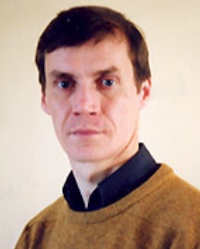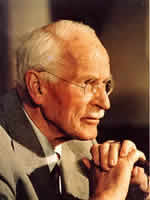 Przewody doktorskie prowadzone lub przeprowadzone w Uniwersytecie w Essex:
Przewody doktorskie prowadzone lub przeprowadzone w Uniwersytecie w Essex:
Promotor: dr Roderick Main
Christine Driver – The God Representation and the Shadow (J)
Abstract: The focus of this research is the impact of an interrelationship between the personal shadow and Christian religious shadow on the internal world.
Jung’s concept of the shadow revolves around the conflict between the ‘light and dark sides’ (Samuels et al 1986:138) of the psyche in which the personal shadow is that which ‘a person has no wish to be’ (Jung 1946 par.470) and contains the feared and disturbing affects which the psyche cannot tolerate or integrate. Within Christian religious motifs there is a parallel schema which we see depicted in religious imagery such as the Last Judgement frescoes in Torcello and Padua. Here the Divine or ‘Light Son’ sits in Glory and in opposition to the Dark Emanation or ‘Dark Son’. The ‘dark son’ contains the human lusts, affects and drives which conflict with the desire for the good and perfect object and are split off into Hell and the collective religious Shadow.

However, when Jung wrote about the ‘problem of the fourth’ (Jung 1991) he explored the shadow aspect of Christian concept of the Trinity and the significance of the ‘dark son’. Jung saw the ‘dark son’ as an ‘opposing will …. necessary for actualization’ (p196) and depicted this ‘dark emanation’ as necessary for separation and individuation.
My research will look at clinical material to consider the human form of the ‘dark son’ e.g., conflictual and aggressive emotions in relation to mother and/or father, and the impact on the personal psyche when these affects become split off shadow aspects of the personal psyche and conflate with, and are exaggerated by, the Christian religious shadow of the Devil/‘dark son’.
The clinical research will be primarily based on a single case study in which the aetiology of the patient’s pathology will be considered in relation to the research question. I will examine the impact on the psyche when there is a conflation and an interrelationship between the personal shadow and the shadow of the Christian God image and consider the impact on the internal world when personal upbringing co-exists with a powerful religious belief system.
Kevin Lu – Simultaneity and Sequence: A Jungian Approach to the Past (J)
Abstract: This thesis has aimed to further facilitate a dialogue between analytical psychology and history. It has focused on asking and answering questions in three related areas:
1) How did Jung envision history? Can classical, Jungian theory contribute anything to history? Can either Jung himself be considered an historian, or can facets of his work be considered historical in any way?
Response: Jung cannot be considered an historian in the traditional sense of the word, and even admits to his inadequacies as such (CW9ii, pp. ix-xi). An initial analysis of some of his statements on history shows both his interest in the subject and his encouragement for the application of analytical psychology to history (CW5.3). He holds, however, contradictory views of history’s purpose, especially the role it plays in the development of both the individual and the collective (compare [CW13.63] with [CW6.231-32]). I suggest that Jung possesses a unique understanding of history, distinguishing between two different types. First, history is viewed as an outmoded barrier hindering greater self-knowledge. This form of history is a creation of the conscious mind, what most have come to know as the academic study of the past. Jung refers to this as objective history (CW10.12). The second form of history – the one with which Jung is most concerned and to which he attributes greater significance – springs from the unconscious. Ultimately, the structures of historical events are pre-formed and “long prepared” in the unconscious (CW10.315; CW8.594). Historical events are merely the vehicles for the expression of the unconscious position. Jung calls thisnatural history (CW10.12). I argue that a more apt distinction between these two types of history is conscious history and unconscious or archetypal historyrespectively.
2) If Jung cannot be considered historically-minded in the traditional sense of the word, can analytical psychology contribute anything to the study of the past? For instance, what would an application of Jungian psychology to history – i.e., a Jungian psychohistory – look like? Does it add any value to either the historian’s craft or the theoretical lenses through which they view the past?
Response: In this section, I aim to not merely ‘talk’ about history, but to ‘do’ some history. I pinpoint two distinct (and some would say opposing), approaches within the historical enterprise – microhistory and global history – and consider how the perspective of Jungian psychology would affect both. At the microhistorical level, I analyze a case of historical possession in early modern England (“The Possession of Thomas Darling [1596]”). At the global historical stratum, I critically assess Arnold J. Toynbee’s use of Jung’s psychological types in evaluating what Toynbee calls higher religions. Under scrutiny, both applications prove to be highly problematic and potentially reductive. The added value, then, to both psychohistory and history more generally, may be limited.
3) Is there a way forward? Are there any Post-Jungian ideas which are better equipped to enrich our knowledge of the past, ones that do not violate core, historical principles?
Response: I argue that Henderson’s (1903-2007) notion of a cultural unconscious – and the subsequent concept of cultural complexes forwarded by Singer and Kimbles – may be key to securing a more fruitful dialogue with history. I use the violent, Chinese suppression of Tibetan protests in March 2008 as a springboard to asking larger questions concerning China’s history. China’s cultural complexes have their foundation in a perceived ‘century of humiliation’, contrasting their previous position as the centre of the global economy in the 17th century. This shared sense of dishonour and shame – which includes the debilitating effects of two Opium Wars, the Japanese occupation of China and especially the Rape of Nanking – are fundamental to understanding China’s more violent outbursts in recent memory. The aggression displayed in the latter part of March 2008 resonates with a previous, violent encounter in the history of China between the government and the Beijing Democracy Movement nineteen years prior. The blood spilled in Tiananmen Square and the streets of Lhasa are different yet similar manifestations of an archetypal defense of the group spirit, further pointing to China’s yearning to both sustain and rediscover a lost, grandiose self-ideal.
Mathew Mather – A study of the alchemical Mercurius, from the perspective of Analytical Psychology (J)
Abstract: The central significance of the alchemical Mercurius, for Jung, seems to have eluded contemporary scholars. The word hardly features in contemporary works on Analytical Psychology and in biographies on Jung. Indeed, it would seem that this phenomenon has been relegated to the dungheap of what has been termed one of Jung’s “curious notions” (Mogenson 1999: 132).
In contrast a study of primary writings indicates that this phenomenon traverses, in a significant way, at least the following 4 areas of Jung’s life and works: 1) personal life, 2) Analytical Psychology, 3) ideas on Religion, and 4) “contemporary” context. The following sample of quotes is illustrative:
Theme 1: Jung’s personal life
For the time being I am still immersed in Mercury who, as he will always try to, has dissolved me almost and just failed to separate me limb from limb. (Jung 1973, letters vol. I, 28 July 1942)
Theme 2: Conceptual (in terms of the terminology of analytical psychology)
he [Mercurius] represents on the one hand the self and on the other the individuation process and, because of the limitless number of his names, also the collective unconscious (Jung 1955: 237)
Theme 3: Religion
Christ appears as the archetype of consciousness and Mercurius as the archetype of the unconscious (Jung 1955: 267)
Theme 4: “Contemporary” context
It might be said that the secret of Merlin was carried on by alchemy, primarily in the figure of Mercurius. Then Merlin was taken up again in my psychology of the unconscious and – remains uncomprehended to this day! (Jung 1963: 255)
These themes and quotes give a sense of the ubiquity, magnitude and also of the radical nature of this phenomenon in terms of Jung’s writings.
The present study thus claims to have identified a “blind spot” in current scholarship. It therefore endeavours to situate this phenomenon more firmly into contemporary Post-Jungian thought, as driven by the following broad research question: What was the significance of the alchemical Mercurius in (a) Jung’s personal life, (b) his analytical psychology, (c) his conception of a renovatio of the God-Image and (d) in terms of his critique of modern western culture?
Christina Sjöström – To what extent is New Age Spiritual Development Qualitatively Similar to Jungian Individuation? (J)
Abstract: The aim of my project is to compare two proposed paths of personal transformation – the Jungian path of individuation and the psycho-spiritual transformation of the New Age, or holistic milieu – to find out to what similarities and differences exist between the two methods. There are two levels to this comparison; the theoretical and the experiential. The theoretical level will be worked at primarily through the findings of a comparative literature review. Having established a theoretical framework this will serve to inform me about the issues which are relevant to raise at the experiential level. I also hope that the theoretical work will help me account for the assumed similarities and differences which arise at the experiential level.
I believe this project is a worthwhile line of enquiry within the field of analytical psychology as certain Jungians feel that Jung has been grossly misinterpreted by the holistic milieu and consequently argue that the path it advocates is inauthentic. This in spite of the great influence Jungian thought has had on the development of the idea of psycho-spiritual transformation and the similarities which exist between the two methods of development. However, the most important Jungian contribution aligning itself with this view has severe shortcomings in that it fails to respect the heterogeneity of the holistic milieu. Additonally it does not consult followers of its object of study to give validity to subjective claims. Whilst some New Agers undoubtedly pursue their beliefs mainly through ego functioning and therefore fail to meet the required needs for greater self-knowledge as it is conceptualised within both fields, it is likely that others have a higher degree of sophistication. Through this project I hope to show that providing that the archetypal process of self transformation is pursued with a high degree of sophistication it is possible to attain the wholeness advocated by Jung through means other than analysis.
Teodora Velletri – Mircea Eliade and Depth Psychology (P)
Abstract: The dissertation aims to investigate Eliade’s conceptual apparatus and its potential relationship with depth psychology. Despite his extensive work on archetypes, myths and symbols, active imagination and rites, concepts which are central to depth psychology, Eliade as it stands now, represents rather a marginal figure in the tradition of depth psychology.
My ultimate goal is to demonstrate how our understanding of depth psychology can be enriched by investigating its philosophical and religious roots. Homans doubts that “psychoanalysis… has simply overcome its religious heritage” (Homans, 1978:135) and puts forward the idea of a “complex interplay” between religion and psychoanalysis.
Following a biographical inquest and a hermeneutical engagement with both scientific and literary works of the Romanian scholar, the potential benefits for the field of depth psychology are explored. The examination of Eliade’s ideas, hopefully, will lead to the following findings.
First of all, they contain penetrating insights into various concepts concerning depth psychology. My initial selection comprises the dialectic between the sacred and the profane, archetypes, myths, tales, symbols, individuation, and active imagination. Although primarily concerned with myth as a historian of religions, Eliade’s interpretation applies to the human phenomena in general (Segal, 1983). He used fantasy and the occult as artistic devices to create hidden worlds behind everyday reality and imagination become essential to understanding the sacred in life. Many of his novels are rooted in Eliade’s personal experience, and written as a way to transcend the profane and find true meaning in his own life.
Secondly, it provides a revealing comparison with Jung, who was a practitioner and it shows to which degree Jung’s thought was attuned to specific aspects of the eliadean text and vice versa.
Thirdly, I am using Eliade’s both scholarly and literary works in the hope that the “themes and structures might illuminate some of his major choices in the study of religion”(Calinescu, 1977:2) and achieve a fresher and in-depth interpretation of his thought. For this purpose I will refer to his broad oeuvre as the eliadean discourse and discuss the poetic and allegorical elements deployed by the Romanian scholar. My argument is built on Eliade’s own theory on the crisis of the contemporary novel and his Spanish analogue, Ortega (1948) and his theory of “imaginary psychology”.
To summarize, the purpose of my thesis is to re - introduce key concepts of Eliade’s work in the hope that” the energy frozen therein will be freed so that it may be used creatively” (Heuer, 2001:656) in the current psychoanalytical discourse. My anticipated conclusion is that Eliade' s thought, far from being passé and inadequate, could prove to be a fertile ground for the re- conception( rethinking) some of the key concepts within depth psychology or/and open new directions of inquiry.
Marcel Van Den – Akker The concept of Renunciation in Religion and analytical Psychoanalysis (J)
Dane z: http://www.essex.ac.uk/


.jpg)

 (Opracowane na podstawie przedmowy Jerzego Prokopiuka do pracy: "Odpowiedzi Hiobowi" Carla Gustava Junga, Wyd. "Ethos", Warszawa 1995)
(Opracowane na podstawie przedmowy Jerzego Prokopiuka do pracy: "Odpowiedzi Hiobowi" Carla Gustava Junga, Wyd. "Ethos", Warszawa 1995)